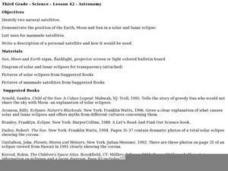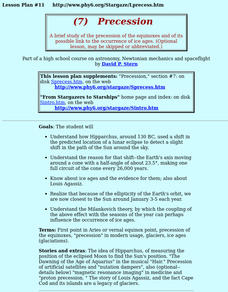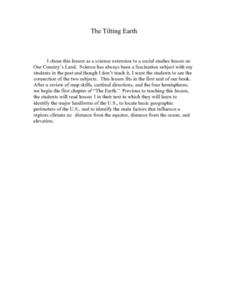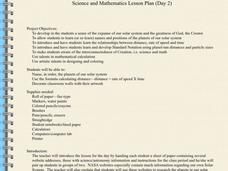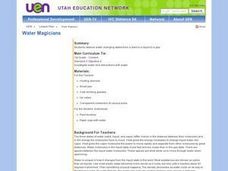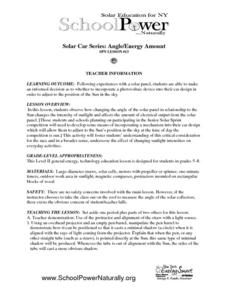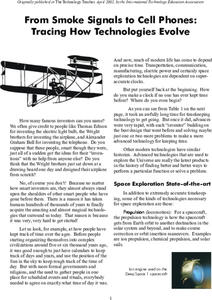Curated OER
Science - Lesson 42 - Astronomy
Third graders demonstrate the position of the Earth, Moon, and Sun in a solar and lunar eclipse. They list uses for manmade satellites and write a description of how a satellite would be use.
Curated OER
Precession
Learners explain how Hipparchus, around 130 BC, used a shift in the predicted location of a lunar eclipse to detect a slight shift in the path of the Sun around the sky. They examine the elliptical orbit in which the Earth travels around...
Curated OER
Sunspots or Lumpy Planets
Young scholars examine the method Galileo used to prove sunspots were actually on the sun instead of objects between the Earth and Sun.. They study the term foreshortening and assess its relevance to observation.
Curated OER
Wax On, Wane Off! the Different Views of the Moon
Students create a three-dimensional model of the Earth and Moon to show the different phases of the moon as they appear on Earth. In small groups, they draw a diagram for a phase, set up the model in the drawn positions then test it with...
Curated OER
Finding the Pole Star
Students study the constellations fo the Big Dipper and Cassiopeia and their use in finding the Pole Star. They realize that other celestial objects--Sun, Moon and planets--share the rotation (and hence rise and set), even though their...
Curated OER
High School Mathematics Problems from Alaska: Writing an Equation: Altitude Range vs. Day in Barrow, Alaska
Students answer questions about the altitude range of the sun over time in Barrow, Alaska.
Curated OER
The Tilting Earth
Fourth graders use a styrofoam ball on a stick to represent earth and a light bulb in the center of the room to represent the sun. They walk around the light, holding their sticks at an angle to show the tilt of the earth's axis. They...
Curated OER
Discrimination Hurts
Fifth graders interpret stereotyping and discrimination as limiting and hurtful behaviors and demonstrate how to address these behaviors in a positive manner. In this discrimination lesson plan, 5th graders use the poem The Woman Who...
Curated OER
The Solar System
Young scholars research the characteristics of planets in our solar system. In this space science lesson, students create a solar system model with each planet arranged according to their distance from the sun. They solve problems using...
Curated OER
Feudal Japan: Shogun
Students discuss the position attained by the shoguns of feudal Japan, who replaced the emperor as the main source of political power and examine how this power was reflected in art.
Curated OER
Famous Women in the Military
Learners identify and research various women and their roles in military history. They describe how modern political positions are affected by differences in ideologies and viewpoints that have developed over time. Finally, students...
Curated OER
Introduction to Scatter Plots and Correlation
Students examine the concept of scatter plots. They compare baseball statistics to locate the ones that correlate with winning, and identify the positive, negative, and no correlation in sets of data using MS Excel.
Curated OER
Our Solar System-- Fact File
For this space science worksheet, students read facts about the solar system. Students look at the diagram showing the position of the planets. Pluto is included as a planet here.
Curated OER
Personal Resources
Pupils evaluate thought and action regarding care of ourselves and our possessions. They develop a positive approach to life and a mature sense of self-worth and value. They develop a an appreciation and a voice for individual...
Curated OER
Water Magicians
First graders observe water changing states from a solid to a liquid to a gas. They predict what they think happen to ice cubes as they sit out. They paint water with paintbrushes outside the classroom in the sun and watch the water...
Curated OER
High School Mathematics Problems from Alaska: Azimuth and Arc Length
Students track the Azimuth sunrise and sunset over time by creating a chart.
Curated OER
Intro to 1D Kinematics with Physlets
Twelfth graders examine illustrations and animations on a Physlets CD in which they must describe motion, analyze graphs, and calculate initial velocity. The Physlet assists in providing active class participation in discussion.
Curated OER
Seasons
In this Earth's seasons worksheet, students study the diagram of the Earth's position as it orbits the Sun at four positions. Students then label the approximate date and season for the Northern Hemisphere at each stage. There is a word...
Curated OER
It's Hot
Third graders examine the effect of sunlight on the earth. Individually, they pick an article of clothing out of a bag and sort themselves based on the color of the shirt and whether it should be worn on a cold or a hot day. To end the...
Curated OER
Solar Car Series: Angle/Energy Amount
Does the angle of a solar panel change the output? Emerging engineers find out! Demonstrate for your class how they can angle a straw to match the angle of light rays coming from a source. Then turn them loose to experiment with the...
Curated OER
Light
Here is a stellar slide show for illuminating middle schoolers' minds on the topic of light! An interactive slide allows viewers to sort light sources by whether or not they are man-made. More objects are displayed and learners discover...
Curated OER
The Solstices
Compare surface temperatures when the solstice occurs in the different hemispheres. Young scientists draw conclusions from their investigation of data collected using spreadsheets and a globe.
Star Date
Build Your Own Galaxy
Don't just look at pictures of the Milky Way galaxy, build it with this hands-on activity in which scientists recreate the galaxy we live in.
NASA
From Smoke Signals to Cell Phones: Tracing How Technologies Evolve
Explore the science of space exploration. Pupils consider technological advances in propulsion, communication, power, navigation, and imaging. They select one of these areas and create a timeline of historical progress that contributed...
